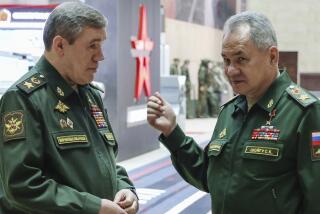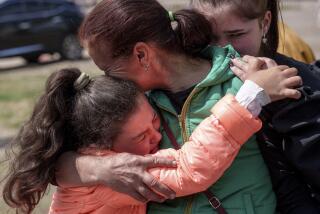Amid Chechnya Siege, Yeltsin Claims Victory
- Share via
MOSCOW — In his first public appearance since sending thousands of Russian troops into the breakaway republic of Chechnya, Russian President Boris N. Yeltsin announced Monday that the military operation to crush the rebels had mainly succeeded.
But even as Yeltsin was delivering an upbeat evaluation of the results of the bloody, 2-week-old campaign to subdue the still-defiant Chechens, other Russian officials warned that rebel commandos had reinforced their positions around the palace still held by Dzhokar M. Dudayev, the Chechen president.
About 2,000 Chechen gunmen armed with 34 armored vehicles, missile launchers and antiaircraft guns had completed a defensive ring around the bomb-shattered capital of Grozny, about half a mile from the presidential palace, the Russian government press service said.
Eighteen captured Russian soldiers are still being held inside the besieged city, where water, electricity, bandages and medicine are reportedly running out.
At a session of the Russian Security Council, Yeltsin announced plans for a military occupation of Chechnya in which the tens of thousands of Russian troops now in the Muslim republic would remain there. Police units would be responsible for restoring order.
“We have approached the point where we can wrap up the military operation and switch to the second stage--that of forming administrative bodies in the Chechen republic,” Yeltsin told the council meeting. “We have come close to restoring constitutional law and order there.”
He said Russian troops might be moved away from Grozny to unspecified bases but said the soldiers will stay in Chechnya “permanently.”
“Chechnya is our republic, and nobody should forget it,” Yeltsin said.
He declared that the army had performed “not badly” and said officials had done a good job of providing minimal living standards for the estimated 200,000 refugees who have fled the bombing and shelling of the residential neighborhoods of Grozny and its suburbs.
The Russian government press service announced that a provisional government headed by Salambek N. Khajiyev--a 53-year-old chemist and Soviet-era oil executive who has been active in the anti-Dudayev opposition--was being set up.
Khajiyev flew to Moscow on Monday and held a news conference at which he bluntly answered those who would call his Government of National Reconciliation a Russian puppet.
“You must be asking yourselves, How legitimate is this body?” Khajiyev said. “It is as legitimate as the Dudayev regime.
“We all know very well that nobody elected Dudayev,” he said, referring to the disputed elections that brought Dudayev to power in 1991.
Last year, after refusing an offer to become Dudayev’s prime minister, Khajiyev said he had no doubt that if given a chance, Chechens would vote against being part of Russia. “We must acquire our statehood, real and not puppet,” he told the newspaper Izvestia.
On Monday, Khajiyev called on Moscow to stop bombing Grozny, where “only civilians are suffering.” He called for new, free elections to resolve Chechnya’s fate. “The people will decide who is legitimate,” he said, adding, “Dudayev must resign and leave Chechnya if he really cares about the welfare of his people.”
Meantime, Khajiyev said, his main task is to restore Chechnya’s economy, which has been ravaged by a Russian economic blockade, as well as the schools, hospitals and social welfare system that have crumbled in the three years since Dudayev declared independence.
Monday’s Russian Security Council meeting had been billed as a showdown between the hawks and doves within the Kremlin, who have been fighting as fiercely as the Chechen guerrillas for influence over Yeltsin. It was unclear who had prevailed, because, after a long closed session, senior officials emerged to make characteristically contradictory statements as to what will happen next.
Nikolai D. Yegorov, nationalities minister and a deputy prime minister, told the Interfax news agency that it was imperative that Grozny be seized quickly and that criminal gangs--presumably Dudayev supporters--be disarmed. Yegorov insisted that most Chechens oppose negotiations with Dudayev and want him ousted.
Vladimir F. Shumeiko--another senior Yeltsin adviser and head of the Federation Council, or upper house of Parliament--said Russia’s Security Council had authorized Yegorov, Sergei V. Stepashin, the head of the Federal Counterintelligence Service, and Gen. Anatoly Kvashnin, a commander in Chechnya, to negotiate for a cease-fire and rebel disarmament.
In a sign that dissent against Yeltsin’s Chechnya policy will not be tolerated, the Russian Defense Ministry confirmed Monday that it had prepared orders to sack three deputy defense ministers who have spoken out against the military crackdown.
But there was no word on whether Yeltsin had signed the decree dismissing the distinguished generals: Boris V. Gromov, the much-decorated commander of the Soviet troops in Afghanistan; Grigory Kondratiev, and Valery Mironov.
The estrangement between Yeltsin and his former democratic allies deepened Monday when Father Gleb P. Yakunin and Lev A. Ponomarev--two heroes of Russia’s pro-democracy movement--quit the Russia’s Choice bloc to protest Yeltsin’s Chechnya policy and called for early presidential elections.
Yeltsin had sharp words for another old ally, Sergei A. Kovalev, his human rights commissioner, who has stayed in Grozny--despite orders for civilians to leave--to protest the bombing there. Kovalev further embarrassed Yeltsin by telling the Washington Post that the United States should revise its hands-off policy toward Russian intervention in Chechnya because the current human rights violations are of international concern and not a purely Russian affair.
Yeltsin snapped back Monday, saying that he shared Kovalev’s concern for human rights but adding that he wondered why the commissioner had not expressed concern over the violence of Dudayev’s regime.
Outside the presidential administration offices near the Kremlin, 24 human rights activists from the group Memorial were arrested after staging a peaceful but unlicensed anti-war protest.
More to Read
Sign up for Essential California
The most important California stories and recommendations in your inbox every morning.
You may occasionally receive promotional content from the Los Angeles Times.













